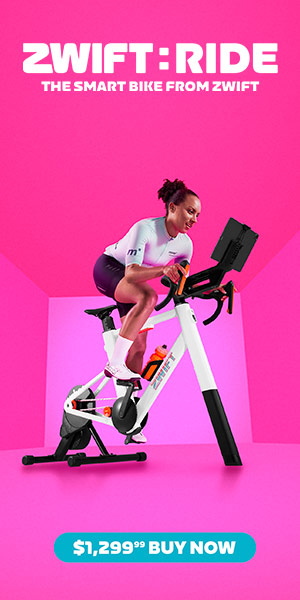The Olympic Park, London. The 2012 Olympic spirit still resonates from the stadiums and venues 10 years on from that magical summer.
The excitement I felt during those days returned as I exited the train at Stratford and walked towards the Olympic Park and the Aqua Centre, the site of the Arena Games Triathlon powered by Zwift.
What are the Arena Games?
The Arena Games is an indoor triathlon that was conceived two years ago during the global pandemic. It is a collaborative endeavour between Super League Triathlon and Zwift, and it is a unique concept that is truly special and a genuine test of a triathlete’s abilities. It brings the sport of triathlon to fans in an exciting new format with a real showbiz razzmatazz.
I liked it. The 1700 fans who snapped up all available tickets liked it. And most importantly, the athletes liked it, as Portuguese triathlete Riccardo Batista said, “it’s exciting!”
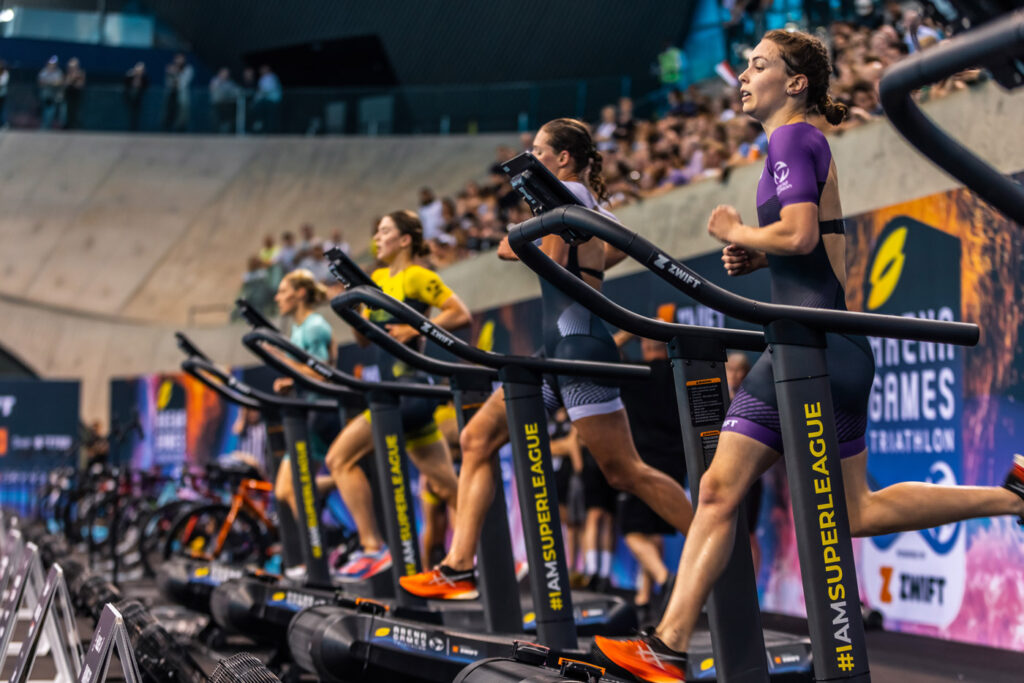
Event Format
The event takes place solely inside the venue. Athletes must swim four lengths of the indoor pool, totaling 200 meters, before transitioning to their bikes where they race in a non-draft Zwift cycling race for 4km, then transitioning and running for 1km on the treadmill, again hosted via Zwift.
It is a whole day event where athletes compete in the morning in a qualifying heat, with the top four from each heat going through to the final, along with the two fastest losers.
The qualifying heat sees the athletes undertake the swim-bike-run format twice. The second race is a pursuit, with the athlete with the fastest time from the first race starting first and each athlete following based on their time gap, as per their finishing results from Stage 1.
Each swim-bike-run iteration lasts roughly 12 minutes, but this is 12 minutes at max effort, and there are just several minutes of recovery between stages.
The final involves three stages. The first is swim-bike-run, which is followed by run-bike-swim. Stage 3 is a pursuit race, with time gaps determined from the previous two stages’ cumulative times. The key is to be consistent. This means that athletes who make the finals will complete five iterations, which is a considerable undertaking and a genuine test of not only speed endurance, but also your ability to recover.
This is a level of repeated intensity in live sport I have not witnessed before.
The Venue
For an event of this magnitude, London’s Aquatic Centre (as spectacular today as it was 10 years ago) provided the perfect setting and gave a new generation of athletes the opportunity to compete at this prestigious venue.
The Tech and Setup
The technical setup was simple. Super League had partnered with Garmin who supplied the Tacx Neo trainers which athletes attached their own bikes to.
Zwift supplied the platform to compete and provided the technical support to ensure the event ran as required, including the use of iPads, replicating the setup many of us have at home.
Curved running machines that operate on momentum were used with Runn Smart Treadmill Sensors from North Pole Engineering.
All equipment was arranged next to the swimming pool so once athletes left the pool there was a short run to where the bikes were situated, then a similar transition to the treadmills.
Due to the ambient temperature of the water, conditions could be described as hot and humid. The temperatures topped out at 25C, increasing the difficulty and making it necessary to have large fans strategically positioned in front of the athlete to help with cooling.
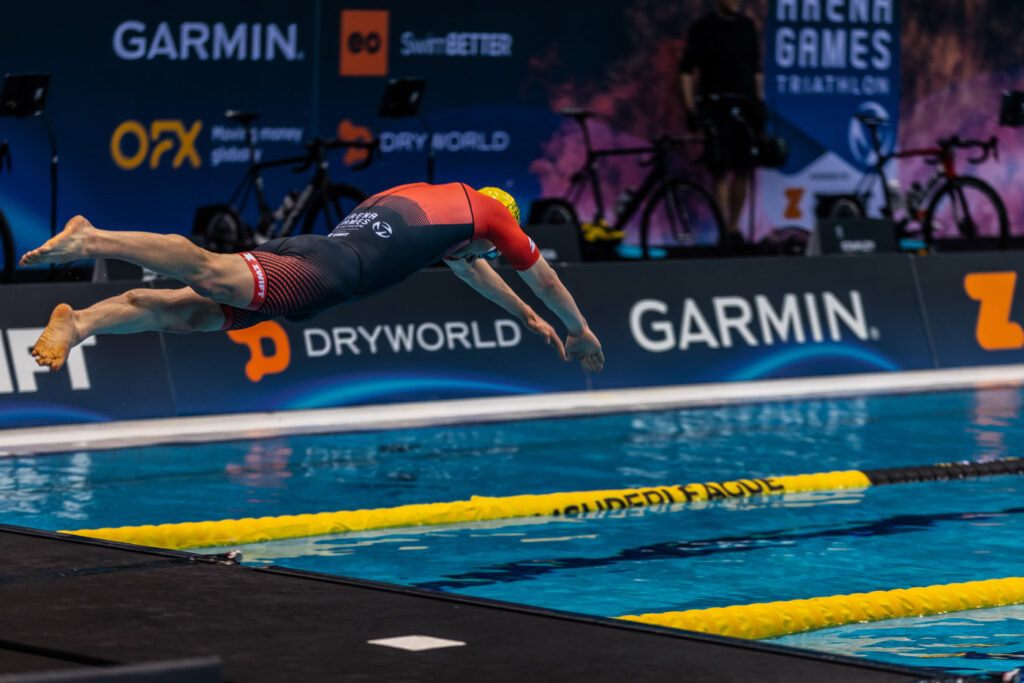
The Athletes
The field was packed with triathlon stars from around the world.
From Great Britain, double Olympic medallist Alex Yee was well-supported by the home crowd. He won silver in the Men’s triathlon and was a member of Great Britain’s gold medal mixed triathlon team at the Tokyo Summer Olympics. He is Super League’s reigning Championship Series winner.
Jess Learmonth, another member of Great Britain’s gold medal mixed triathlon team, was in attendance. Jess won the first-ever Arena Games title in Rotterdam in 2020. Also from Great Britain was Beth Potter, an athlete everyone was fearing, especially with her running abilities, having run a world record time of 14:41 on the road for 5km.
Germany’s 2020 Arena Games Champion Justus Nieschlag was back from injury and had finished third in the Munich Area Games several weeks earlier.
From Italy, Nicolò Strada, 2018 Italian Junior National Champion.
From France, Cassandre Beaugrand, another superstar having picked up a bronze medal in the Mixed Relay at the Tokyo Olympics.
In summary, the calibre of the participants indicated that this event is hugely popular amongst the athletes.
First Impressions
Upon entering the Arena, it was overwhelming to see the attention to detail that had been paid to ensure that the event had that level of polish that is usually only reserved for mainstream sports like football, with sponsorship branding strategically placed. It was hard not to spot the famous orange Zwift blimp; Zwift are experts at marketing.
Huge screens seamlessly formed part of the backdrop to the event, so once the racing started, you found yourself switching between watching the athletes as they pushed themselves to their limits on the bike, to seeing how their efforts and their matching-coloured avatars, translated into the world of Zwift.
As the qualifying heats started, insightful commentary was piped over the PA system to keep the casual watcher informed and a background of motivating tunes ensured all senses were engaged. This really was an energetic and exciting experience to be part of, and I felt privileged to have a front-row seat to this showbiz style sporting event that was being hosted by Markus Floth from MTV Austria and Olympic 2016 bronze medalist Vicky Holland.
Even the Referees or “Technical Assistants” as they were called had the showbiz appearance and were hard to miss, decked in striped shirts like they had been plucked straight from the NFL.
The Races
The races were very fast and explosive, and you found yourself getting emotionally involved. It was hard not to get caught up in this high-energy event, and fortunately the onscreen graphics and Vicky Holland’s insightful commentary were able to translate what was going on.
The noise, heat, excitement of the crowd and full-on commitment of the athletes created an atmosphere I had never experienced. This was something different. This was exhilarating to watch and be part of. I enjoyed it.
The heats were competitive, where athletes had to tread the line between going too hard but trying to qualify with enough fuel in the tank for the final later in the day.
The Women’s race final was dominated by France’s Cassandre Beaugrand who led from the second stage and was untouchable in the pursuit.
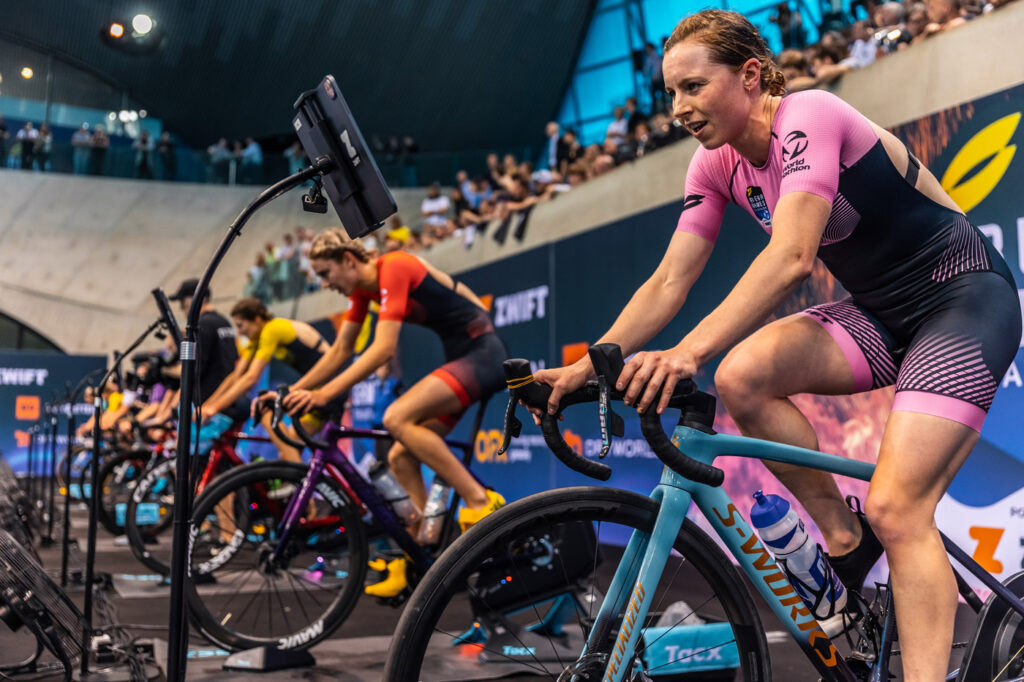
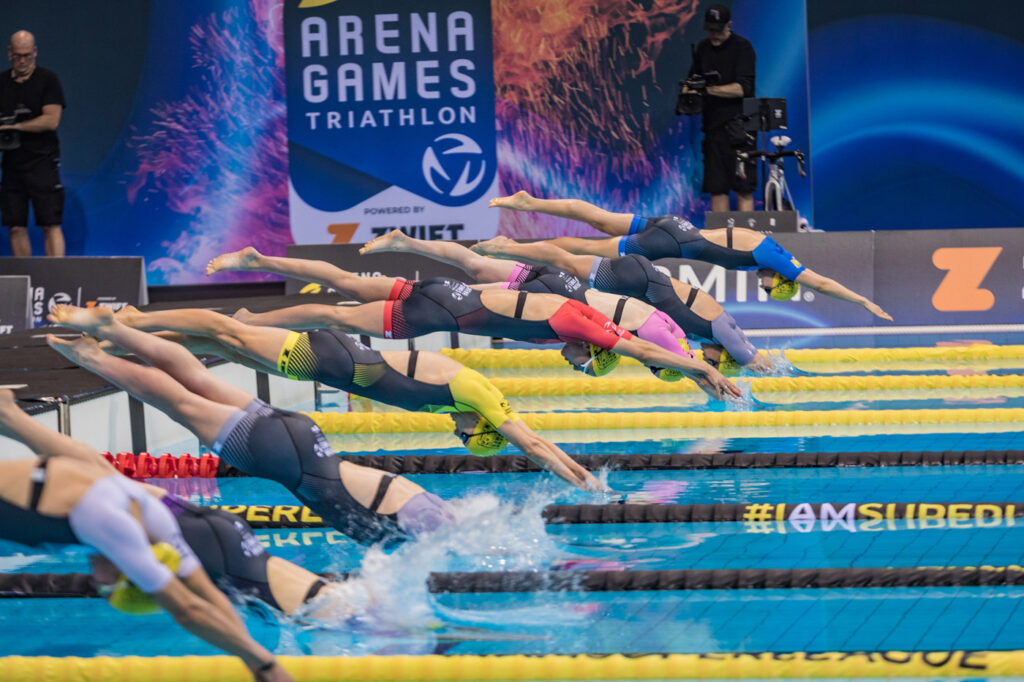
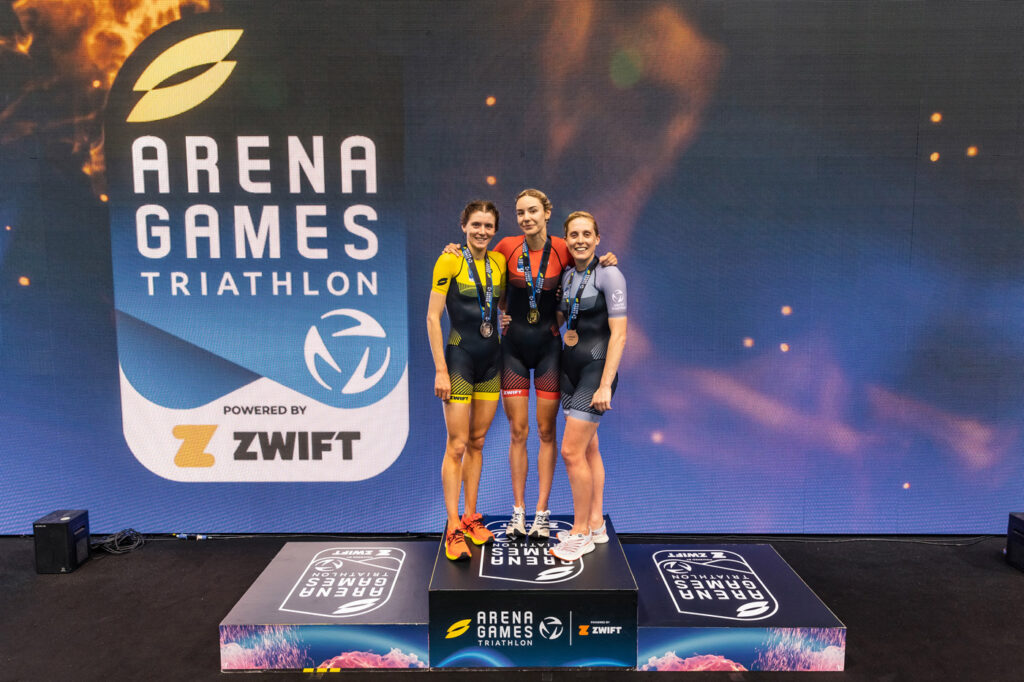
Similarly, in the Men’s race, Justus Nieschlag dominated the second stage and was too strong in the pursuit, winning by some margin.
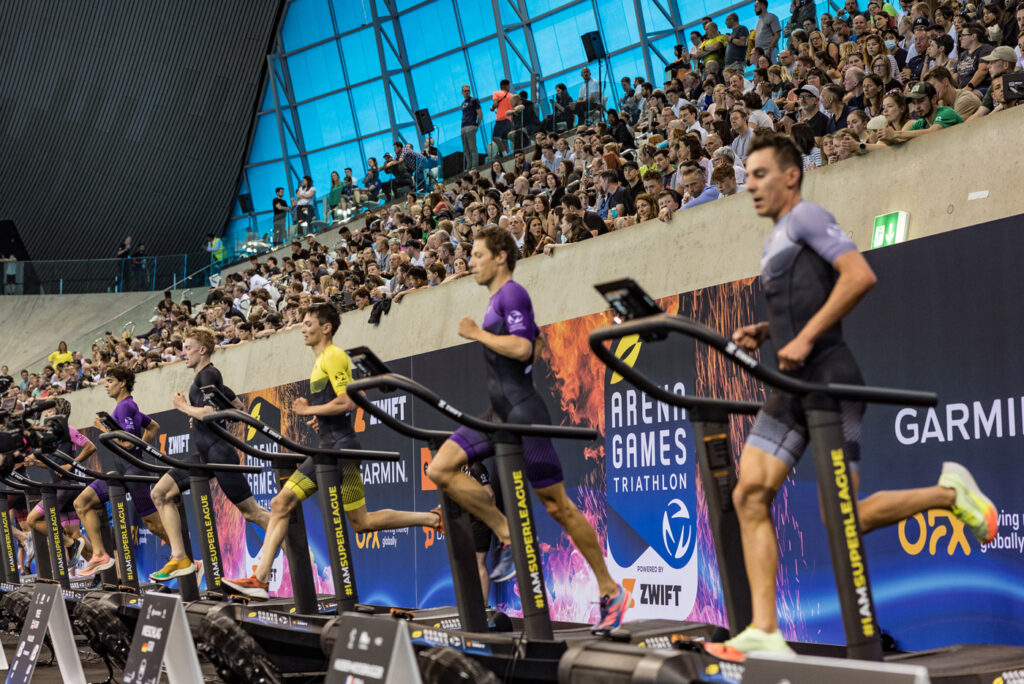
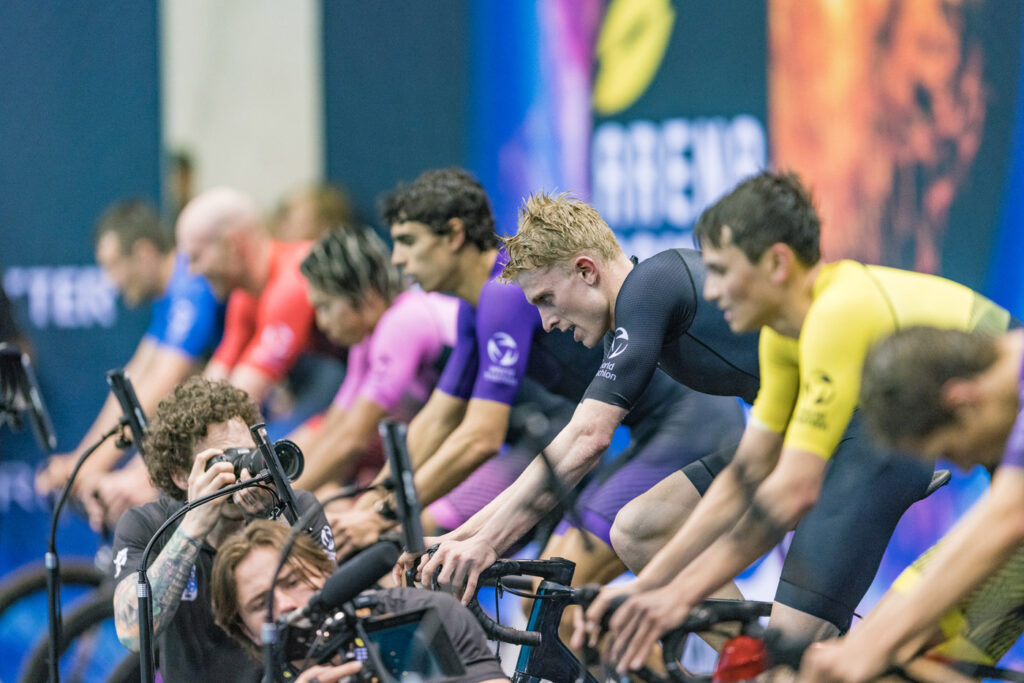
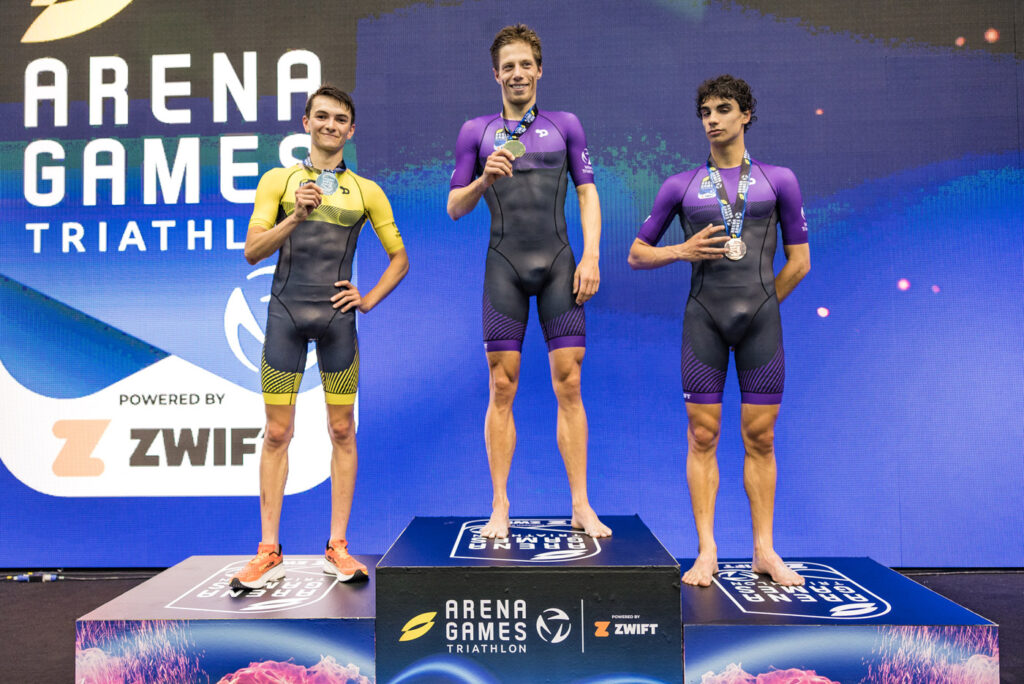
What’s Next?
As soon as the medals were handed out, the grand backdrop that I had spent the day enjoying was dismantled at speed as all the equipment needed to recreate the magic was shipping to Singapore for the Grand Finale on 6th-7th May, where the format will expand to include 40 athletes (double the number in Munich and London).
I for one will be tuning in to watch the event live. I can assure you it’s an entertaining watch; my only regret is that I won’t be there in person to do so.
Longer-term Vision
Is this the future? Is this the dawn of a new era in triathlon? I would certainly like to hope so, and all evidence appears to indicate this. World Triathlon is partnering with Super League Triathlon on the 2022 Arena Games Triathlon World Championship Series powered by Zwift and together, they are going to crown the first Esports World Champions in Triathlon.
Michael D’hulst, Super League Triathlon CEO and Co-Founder of the Arena Games, aims for this to be considered for inclusion in the Olympics as early as 2028. Ambitious, yes. Possible, yes. Especially with Eric Min and Zwift sharing a similar vision for indoor cycling.
Given the complexities of the undertaking, there were minor technical issues, which is a credit to those involved.
Having never taken part in a triathlon, always being put off by the swim legs which usually involved a cold lake, I certainly believe that if this concept could be scaled for participation at a local level, many people would participate and I would be one of the first to sign up. The next challenge is making this scalable to the masses, but the adoption of smart trainers and other Zwifty tech over the last few years as a consequence of the global pandemic leads me to think this is possible. I’m just delighted that I have been able to watch the start of this new spectacle from the front row.
